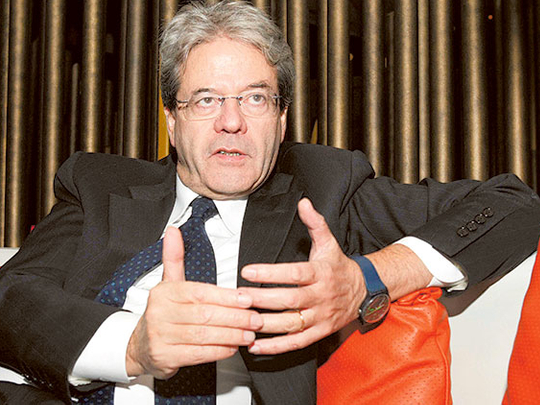
Dubai: Italy’s Foreign Minister is hoping the freefall in global oil prices will not impact trade with the Middle East at a time when a move by the European Central Bank could boost exports.
“The good shape of the economies in this area of the world is very important to our economy,” said Paolo Gentiloni, Italy’s Foreign Minister, in an interview in Dubai on Sunday night.
The ECB is expected to make a decision on introducing quantitative easing to the European currency union in the first quarter of 2015. Quantitative easing, an alternative monetary policy, is likely to make European exports more attractive to foreign markets by weakening the Euro.
But a decision last week by the Organisation of the Petroleum Exporting Countries (Opec) to keep its output ceiling at 30 million barrels a day could hamper purchasing power in the Middle East as oil prices continue to fall.
“We will see what will happen in the Gulf region,” said Gentiloni.
Italy wants to enhance trade with Middle East countries like UAE as it looks to pull itself out of recession. In 2013, bilateral trade between Italy and the UAE was €7 billion (Dh31.9 billion)
Two-way trade between Italy and the six Gulf Cooperation Council (GCC) countries, which includes three Opec members, was worth €21.4 billion in 2013.
Pressure is on the ECB to take action after inflation in the bloc recently dropped to a five year low.
“If the ECB would really decide something like quantitative easing it would be wonderful news for us,” said Gentiloni.
The Italian government, which currently holds the presidency of the EU, wants to see a greater effort from the ECB to stimulate the European economy.
“We are convinced that a more significant push from the monetary intuitions and from the investment plans would help,” Gentiloni said.
Italy’s economy remained in recession in the third quarter, shrinking by 0.1 per cent, after unexpectedly slipping in the second quarter.
Rome is proposing to cut its structural deficit by 0.3 per cent of gross domestic product next year, compared with a 0.7 per cent cut requested by the European Union.
Italy, a net energy importer, has seen little respite in the second half for its economy despite the global collapse in oil prices, Gentiloni said.
Italy imports a significant amount of energy from Russia, which is under sanctions, and from North Africa, which has been marred by instability.












